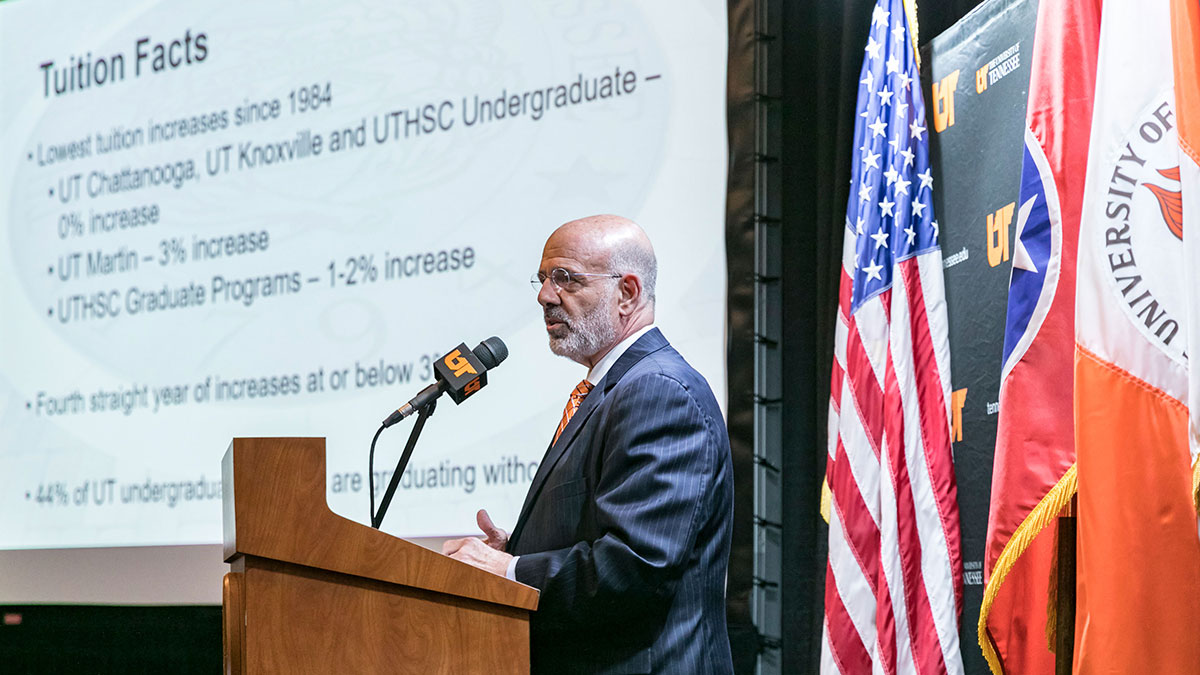 Photo by Erik Campos
Photo by Erik Campos
KNOXVILLE – The University of Tennessee Board of Trustees today approved the record fourth year of low tuition increases, including two campuses remaining flat.
UT Knoxville and UT Chattanooga will not increase tuition for undergraduate students for fiscal year 2018-2019. UT Martin will have a 3 percent tuition increase, which is within the Tennessee Higher Education Commission range of 3 percent or less.
In March, trustees approved not increasing UT Health Science Center tuition for in-state or out-of-state undergraduate students.
UT President Joe DiPietro said the support of Gov. Bill Haslam and the state legislature as well as the Board’s commitment to low tuition made the zero increases—something unseen since 1984—possible.
“I’m also pleased that at a time when stories of high student debt make headlines, 44 percent of UT undergraduates finish with a bachelor’s and without debt,” he said. “That beats the national average of 30 percent of students graduating without debt.”
At UT Knoxville, students will see some fee increases. The student program fee will increase by $22 per student while the capital fee will increase by $14 per student. Any fee increases at UT Chattanooga would cover increased operating costs for specific programs.
UT Martin students also will see some fee increases. UT Martin’s program and service fee will increase by $32 per student, as approved by the Student Government Association, to enhance programming to a multicultural perspective. UT Martin also will establish a green fee of $10 per student, at the request of the Student Government Association, to create a Center for Sustainability.
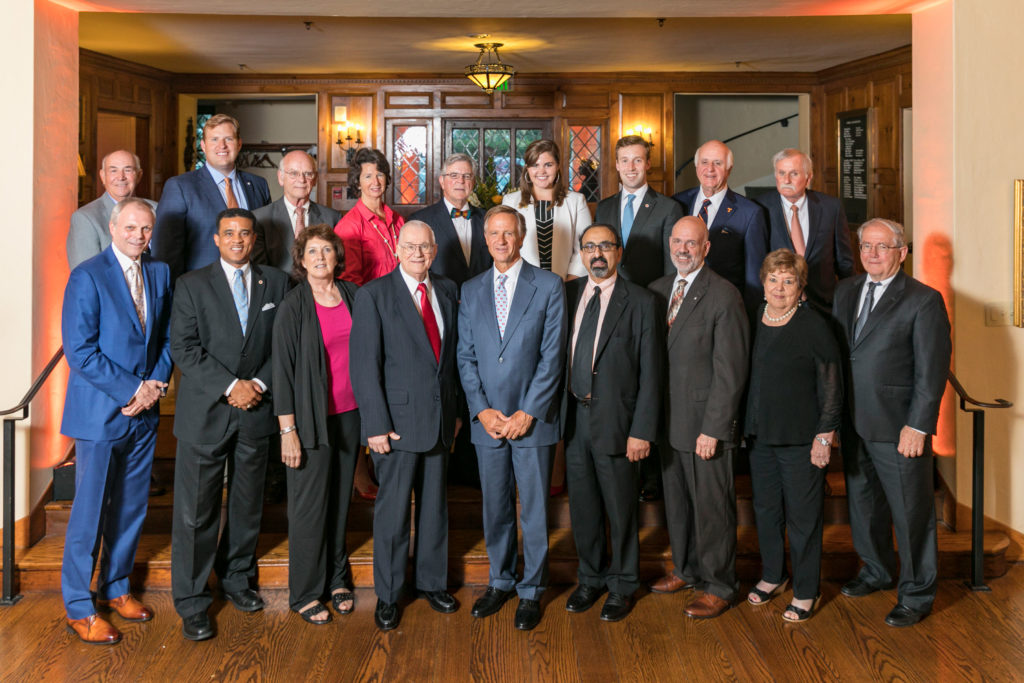
Photo by Erik Campos
This meeting also was the last for all of the current trustees. At the request of Gov. Bill Haslam, the legislature approved the University of Tennessee Focusing on Campus and University Success Act. The act restructures the Board and reduces the size of the Board to 12 trustees from 27. New board members begin their service on July 1.
Vice Chair Raja Jubran spoke about the work that he and the other trustees did to change the traditional opinion of a trustee’s role as a seat for a booster to rubber stamp administrative decisions.
“Together as a board, we recognized that tax and tuition payers could no longer afford traditional passive roles for an industry that is so critical for the preparation of future leaders,” he said. “It was essential that this board of trustees, with the support of the governor, challenge the status quo to inject more accountability, focus on real metrics, discuss openly the various taboo subjects and force critical cultural or traditional changes needed to ensure a sustainable overall business model.”
Jubran offered advice to the new trustees that included to ask the tough questions, demand transparency and to insist on knowing “the good, the bad and the ugly” while guarding the central values of academic excellence through the preservation of academic freedom.
“Protect and reward our most valuable asset, our faculty,” he said. “I assure you that at UT, we are fortunate to have many committed and very product, results-oriented faculty members that deserve to be rewarded and paid market salaries. At the same time, some are not as productive or committed and are in need of improvement or termination.”
He also urged them to remember that the economic pressures on the students are as real as those facing universities and the legislature.
“Trustees come and go,” he said. “Politicians come and go. Presidents and chancellors come and go. Our institution will always survive as long as it delivers on its promises to the greater community.”
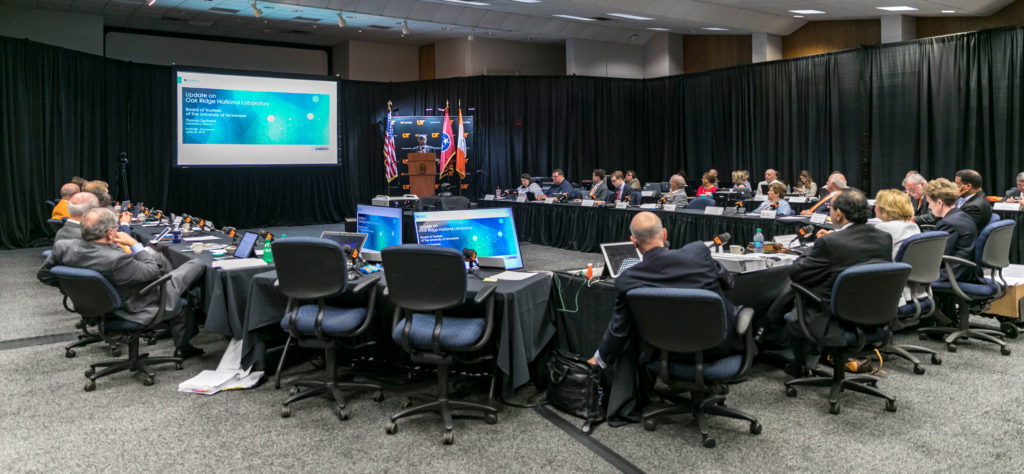
Photo by Erik Campos
DiPietro, in his remarks, praised the current trustees for their work and service.
“Today is a day of many different and mixed emotions for me as this board ends its term,” he said. “I can’t say enough about the engagement and support of members of this board. Nor can I thank you enough for your volunteer service to the University of Tennessee.”
He noted some of the key accomplishments under the trustees’ leadership:
- Developing a system-wide strategic plan that focused on aligning UT priorities with state and national goals
- Working to find long-term sustainable funding
- Record setting four years of low tuition increases
- Record setting private gifts with the naming of four colleges across the system
- Growing research funding to a record-high, system-wide $481 million in sponsored-program expenditures.
“I sincerely appreciate the countless unpaid hours you put in and your steadfast support of both me and the university,” he said. “Without you, we could have never accomplished all we have over my tenure. You have made us a better place.”
DiPietro also spoke about the role the Oak Ridge National Laboratory’s new Summit supercomputer will have on advancing the University’s research. Summit, the world’s most powerful and smartest scientific supercomputer, was unveiled at Oak Ridge National Lab (ORNL) earlier this month.
“Our partnership with Battelle to manage ORNL has placed us at the forefront of innovations and discovery in many key areas,” he said.
The supercomputer is eight times more powerful than ORNL’s previous top-ranked system, Titan. At its peak performance, it can make 200,000 trillion calculations per second.
“So, this supercomputer can calculate in one second what it would take you six billion years to calculate,” DiPietro said. “Summit also will be capable of more than three billion billion calculations per second and provide unprecedented computing power for research in energy, advanced materials and artificial intelligence, enabling scientific discoveries that were previously impractical or impossible. Having access to the world’s fastest supercomputer means our researchers will continue to be at the forefront of innovations and discoveries.”
Protecting faculty members’ academic freedoms through tenure remains a high priority, DiPietro said. However, the tenure process must be rigorous and ensure that only the most exceptional faculty members earn it.
“The trustees’ concerns about the rigor of our tenure process have been widely dismissed over the past two years. While I did not dismiss those concerns, I believed that our process was rigorous,” he said. “Unfortunately, this year, as I took a detailed look at whether we were reviewing tenure cases with an appropriate level of rigor, I was very disappointed after reviewing dossiers.”
DiPietro plans to ask the incoming trustees for approval to appoint an external committee to review current processes and procedures for considering faculty tenure and promotion to achieve greater rigor and consistency.
“When the rigor of the process is questioned or careless due to relaxed procedures, it compromises the value of tenure for all, especially those that are well worthy of the award,” he said.
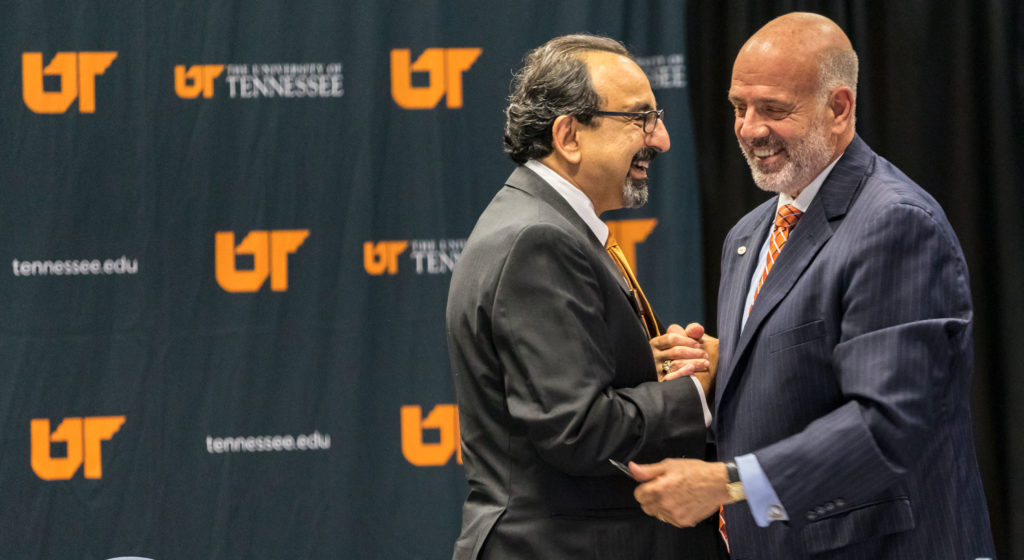
Photo by Erik Campos
In DiPietro’s yearly evaluation, Vice Chair Raja Jubran called DiPietro’s performance more than satisfactory. In the evaluation, he wrote, “Dr. DiPietro’s integrity and selfless commitment to doing what is best for the University continue to be his greatest strengths, and I continue to believe he has been and is the right president at the right time.”
During the meeting, trustees approved the naming of colleges at the UT Institute of Agriculture and UT Chattanooga to join UT Knoxville’s Tickle College of Engineering and Haslam College of Business, which were named in the past four years.
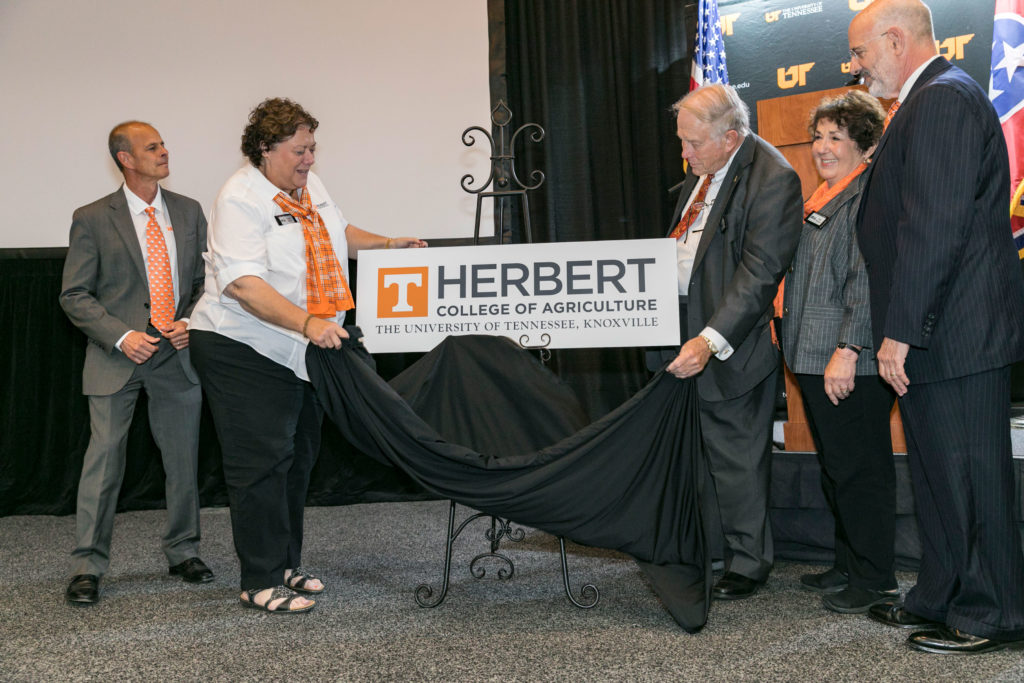
Photo by Erik Campos
Trustees recognized Jim and Judi Herbert for their transformational gift to the UT Institute of Agriculture and approved renaming the College of Agricultural Sciences and Natural Resources to the Herbert College of Agriculture.
“We are especially pleased about enhancing the student experience through internships in national agribusinesses and international work,” said Jim Herbert. “We hope this gives students studying agriculture every opportunity to become great contributors to their world.”
Judi Herbert added, “Jim loves to say that to whom much is given, much is expected, and it’s a mantra by which we live. The University of Tennessee is where many of our family members have called home, so it was only natural to reinvest in this special place.”
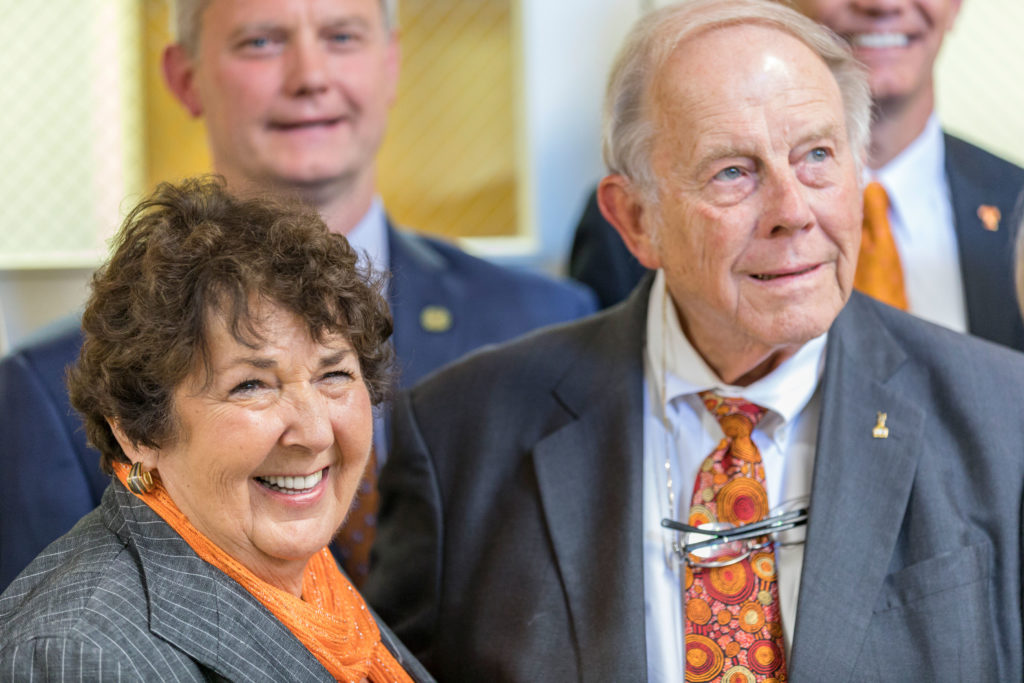
Photo by Erik Campos
Jim Herbert completed a degree in animal husbandry in 1962 while Judith Herbert finished her degree in English in 1963. James Herbert co-founded Neogen, a publically held company that focuses on the development, manufacturing and marketing of products for food and animal safety.
Judi Herbert serves on the UT Knoxville College of Arts and Sciences Dean’s Advisory Board and maintains an interest in the Writing Center. James Herbert has served on the UT Institute of Agriculture Advancement Board and is a member of the UT Foundation Board of Directors.
“This tremendous gift is most amazing because of its flexibility,” said Tim Cross, chancellor of the Institute of Agriculture. “The Herberts’ desire to enhance student learning, faculty engagement and programs make this endowment truly capable of empowering the Herbert College of Agriculture for generations.”
Also during the meeting, UT Chattanooga announced a $40 million gift — the largest philanthropic gift in its history — to its College of Business from Gary W. Rollins and Kathleen Rollins of Atlanta. Trustees approved naming the UTC College of Business the Gary W. Rollins College of Business.
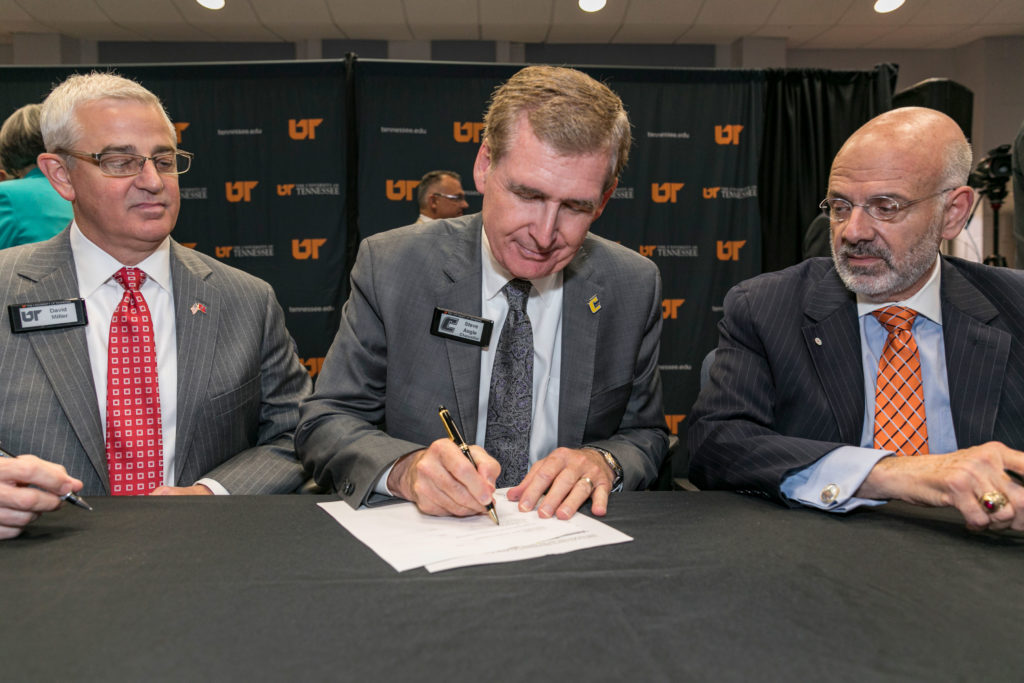
Photo by Erik Campos
A 1967 UTC graduate with a B.S. degree in business, Gary W. Rollins is the vice chairman and CEO of Rollins, Inc., a New York Stock Exchange corporation with numerous holdings including Orkin, the world’s largest pest control company. In supporting his alma mater, he said the college has the credentials and accomplishments to become recognized as a national leader in business education and applied business research.
“The UTC College of Business, under Dean Robert Dooley’s leadership and fully supported by Chancellor Steve Angle, has a history of success built around community involvement that offers students hands-on experience and, ultimately, a stronger opportunity to be job-ready upon graduation,” Rollins said.
Kathleen Rollins, executive director of the Gary W. Rollins Foundation, said uses of the gift under consideration include creating and supporting applied research opportunities, scholarships, recruitment of faculty, capital improvements to renovate classrooms, computer labs, offices and common areas in Fletcher Hall, home of the college.
Angle said the gift serves as a milestone in the history of the UTC and its ability to serve Chattanooga and the region.
“This gift is not only unprecedented in its generosity to our university, it will be transformational in its impact,” Angle said. “Almost without exception, every great university has an outstanding college of business, and the Rollins’ gift will enable us to raise the bar for success higher than ever before.”
Trustees also approved the University’s request to the Tennessee Higher Education Commission for funding $205 million in construction projects for fiscal year 2018-2019. Those projects include $81.5 million for an energy and environmental science research building at UT Institute of Agriculture; $9.9 million for an audiology and speech pathology building for UT Health Science Center; $98 million for a nursing building at UT Knoxville; and $26.1 million for renovating Maclellan Gymnasium.
They also approved a five-year, $614 million for capital construction plan, which will also be presented to the commission.
Also during the meeting, trustees presented House Joint Resolution No. 737 honoring David Millhorn to his widow Sherry Millhorn and daughter Emily Olukalns. Millhorn, who served as senior vice president emeritus and national laboratory relations advisory, died in December 2017.
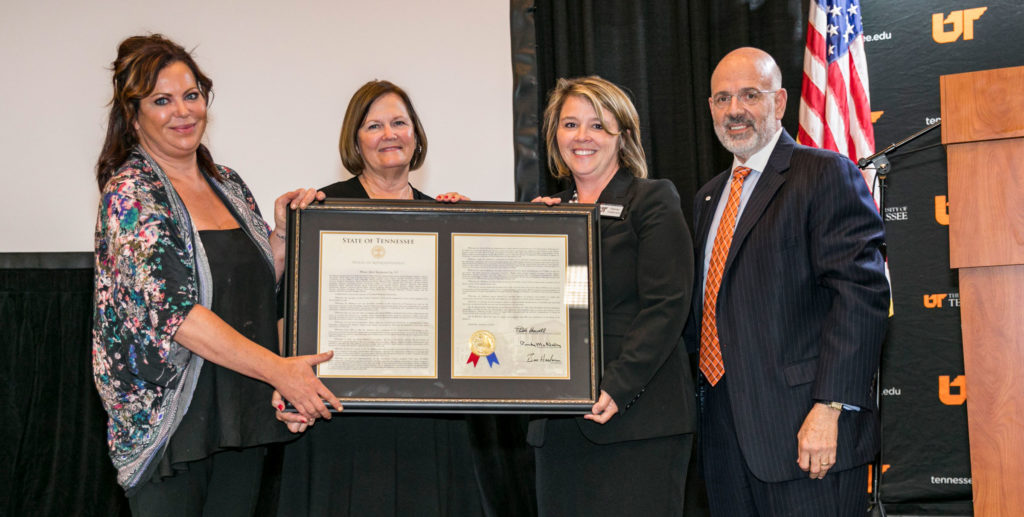
Photo by Erik Campos
“He never stopped dreaming. He wanted to make the world a better place and especially the great state of Tennessee,” Sherry Millhorn said. “He just had a big orange heart.”
Stacey Patterson, vice president for research, outreach and economic development and president of the UT Research Foundation, said David Millhorn challenged those around him to think big and work hard to make those ideas a reality.
“Dr. David Millhorn leaves behind an indelible legacy of integrity and morality in public life, compassion and loyalty in private life, and diligence and dedication in all his chosen endeavors,” Patterson said.
During Millhorn’s tenure with UT, where he served as executive vice president for research and as president of the UT Research Foundation, he:
- Helped lead UT Battelle’s successful contract with the U.S. Department of Energy to manage Oak Ridge National Laboratory;
- Led implementation of the Governor’s Chairs program with joint UT-ORNL appointments for world-class scientists;
- Helped lead UT-ORNL to win a $259 million award to create the Institute for Advanced Composites Manufacturing Innovation, which involved several states and more than 120 advanced manufacturing companies.
In other business, the trustees approved:
- Naming the Ralph D. Heath Integrated Business and Engineering Program in the UT Knoxville Tickle College of Engineering
- Fiscal year 2018 operating budget of more than $2.4 billion, which includes faculty and staff salary increases for the coming year
- $47.8 million request for fiscal year 2019-2020 capital maintenance projects
- $28.1 million for fiscal year 2019-2020 revenue/institutionally funded projects
- Tenure recommendations
- New UT Chattanooga program of a Bachelor of Applied Science degree in mechatronics
- Revised campus tenure review procedures to comply with new requirements of Board tenure policy
- UTHSC strategic plan
- UT Martin strategic plan
